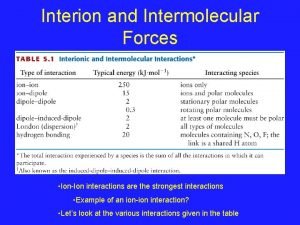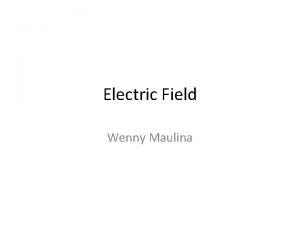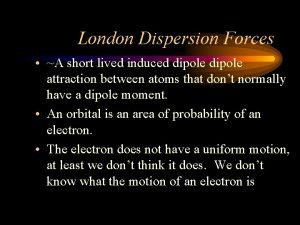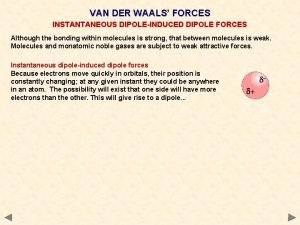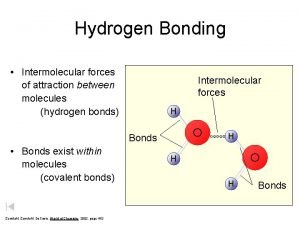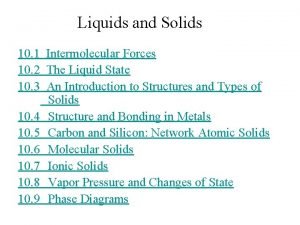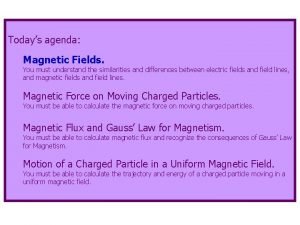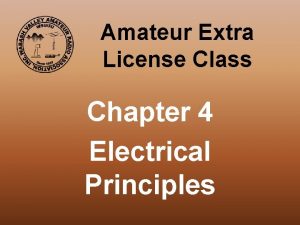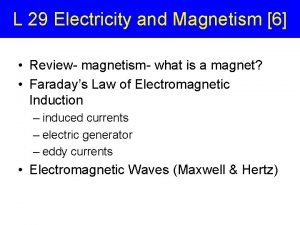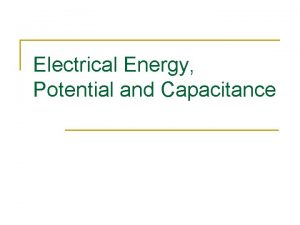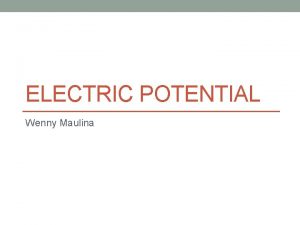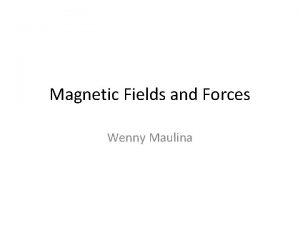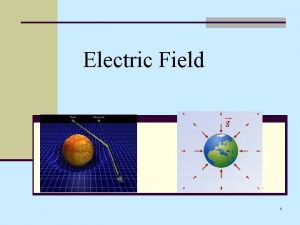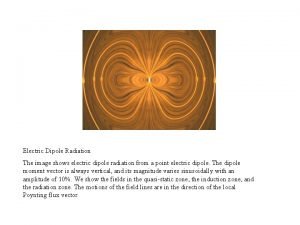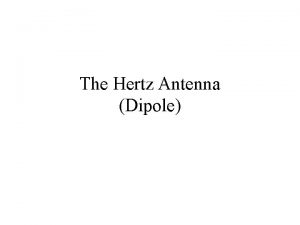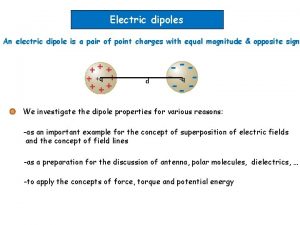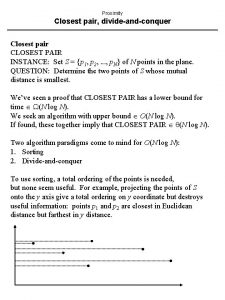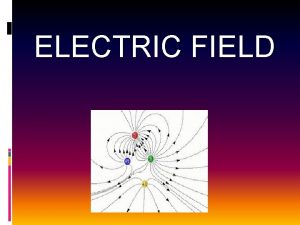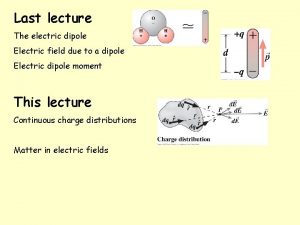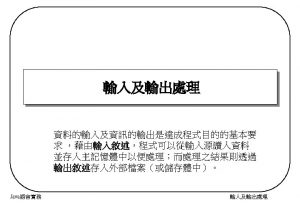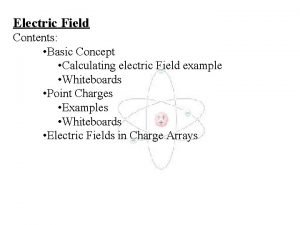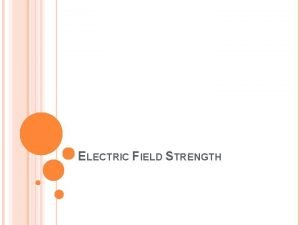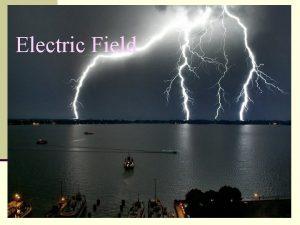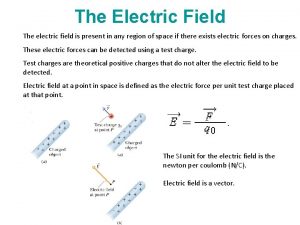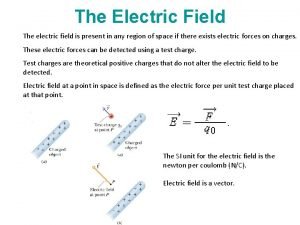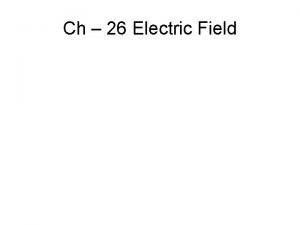Electric Field Wenny Maulina Electric Dipole A pair
























- Slides: 24

Electric Field Wenny Maulina

Electric Dipole • A pair of equal and opposite charges q separated by a displacement d is called an electric dipole. It has an electric dipole moment p=qd. • Given a uniform external field • Then since the charges are of equal magnitude, the force on each charge has the same value • However the forces are in opposite directions! • Therefore the net force on the dipole is Fnet = 0

Torque on a Dipole • The individual forces acting on the dipole may not necessarily be acting along the same line. • If this is the case, then there will be a torque acting on the dipole, causing the dipole to rotate. The torque is then given by t = q. E dsinf d is a vector pointing from the negative charge to the positive charge

Potential Energy of a Dipole • Given a dipole in an external field: • Dipole will rotate due to torque • Electric field will do work • The work done is the negative of the change in potential energy of the dipole • The potential energy can be shown to be

Example • Sebuah dipol listrik terdiri dari dua muatan yang berlawanan besarnya q = 1 x 10 -6 C dan terpisah satu sama lain d = 2 cm. Dipol tersebut ditempatkan di dalam sebuah medan luar yang besarnya 1 x 105 N/C. Tentukan (a) Besarnya momen gaya (torka) maksimum yang dikerahkan oleh medan pada dipol (b) Kerja yang harus dilakukan oleh sebuah pengaruh luar untuk memutar ujung dipol menjadi ujung lainnya, dengan memulai dari kedudukan sejajar (θ = 0)

Electric Field Ring of Charge

Electric Field Line of Charge

Electric Flux and Gauss’s Law Electric flux is a measure of the electric field perpendicular to a surface:

The electric flux through a surface is defined to be the inner product of the electric field and the surface vector: For a closed surface, it is

(a) The electric flux through the surface = EA. (b) When the area vector makes an angle f with the vector E, the area projected onto a plane oriented perpendicular to the flow is A perp. = A cos f. The flux is zero when f = 90 o because the rectangle lies in a plane parallel to the flow and no fluid flows through the rectangle A flat surface in a uniform electric field.

Electric Flux and Gauss’s Law Gauss’s law states that the electric flux through a closed surface is proportional to the charge enclosed by the surface:

. FE = ò E d. A cos f = ò E d. A = E ò d. A = E (4 p R 2) = (1/4 p eo) q /R 2) (4 p R 2) = q / eo. So the electric flux FE = q / eo. Now we can write Gauss's Law: . FE = ò E d. A = ò |Ed. A| cos f =Qencl /eo Electric FLUX through a sphere centered on a point charge q.

Spherical Gaussian surfaces around (a) positive and (b) negative point charge.

Gauss’s Law can be used to calculate the magnitude of the E field vector:

A coaxial cylindrical Gaussian surface is used to find the electric field outside an infinitely long charged wire.

Applying Gauss’ Law and Cylindrical Symmetry:

A cylindrical Gaussian surface is used to find the electric field of an infinite plane sheet of charge.

A Charged Isolated Conductor; The External Electric Field: s is the charge per unit area. qenc is equal to s. A.

Applying Gauss’ Law, Planar Symmetry Non-conducting Sheet:

Applying Gauss’ Law, Spherical Symmetry: Fig. 23 -19 The dots represent a spherically symmetric distribution of charge of radius R, whose volume charge density r is a function only of distance from the center. The charged object is not a conductor, and therefore the charge is assumed to be fixed in position. A concentric spherical Gaussian surface with r >R is shown.

Under electrostatic conditions the electric field inside a solid conducting sphere is zero. Outside the sphere the electric field drops off as 1 / r 2, as though all the excess charge on the sphere were concentrated at its center. Electric field = zero (electrostatic) inside a solid conducting sphere

Example • Suatu bola konduktor (q = 10 μC) berjari-jari 10 cm ditempatkan diruang hampa. Hitung kuat medan listrik di titik yang berjarak r 1, r 2, dan r 3 dari pusat konduktor jika: a) r 1 = 15 cm, b) r 2 = 10 cm, dan c) r 3 = 5 cm

Exercise Suatu dipol listrik terdiri dari 1 muatan positif +q dan 1 muatan negatif –q yang terpisah pada jarak 2 d. Hitung kuat medan listrik pada titik P yang berjarak y dari pusat dipol. Anggap y >> d 2 d

Exercise Menurut hasil eksperimen, medan listrik di suatu tempat tertentu di atmosfer bumi arahnya ke bawah. Pada ketinggian 300 m besar kuat medannya 50 N/C. Sedangkan pada ketinggian 200 m besarnya 150 N/C. Hitung jumlah muatan total dalam sebuah kubus yang sisinya terletak pada ketinggian 200 m dan 300 m. Abaikan kelengkungan bumi!
 Ion-dipole interaction example
Ion-dipole interaction example Energy of dipole in electric field
Energy of dipole in electric field The gaussian surface is
The gaussian surface is Ion induced dipole example
Ion induced dipole example Dipole-dipole interaction example
Dipole-dipole interaction example Dispersion forces vs dipole dipole
Dispersion forces vs dipole dipole Liquid properties
Liquid properties Intermolecular forces on vapor pressure
Intermolecular forces on vapor pressure Surface tension intermolecular forces
Surface tension intermolecular forces London dispersion forces induced dipole
London dispersion forces induced dipole Induced dipole
Induced dipole Van der waals forces
Van der waals forces Intermolecular forces of attraction
Intermolecular forces of attraction Dimethyl ether dipole dipole
Dimethyl ether dipole dipole Closest packed structures
Closest packed structures Square well potential
Square well potential Wenny rahayu
Wenny rahayu Magnitude of magnetic force
Magnitude of magnetic force Q factor of capacitor
Q factor of capacitor Difference between electric field and magnetic field
Difference between electric field and magnetic field Units of a charge
Units of a charge Electric field formula voltage
Electric field formula voltage Chapter 21 electric charge and electric field
Chapter 21 electric charge and electric field What is electric potential
What is electric potential Chapter 21 electric charge and electric field
Chapter 21 electric charge and electric field
